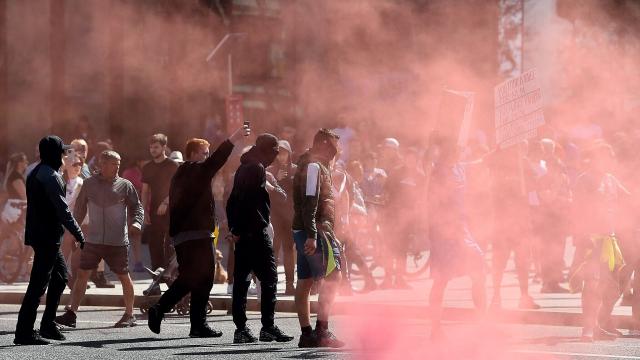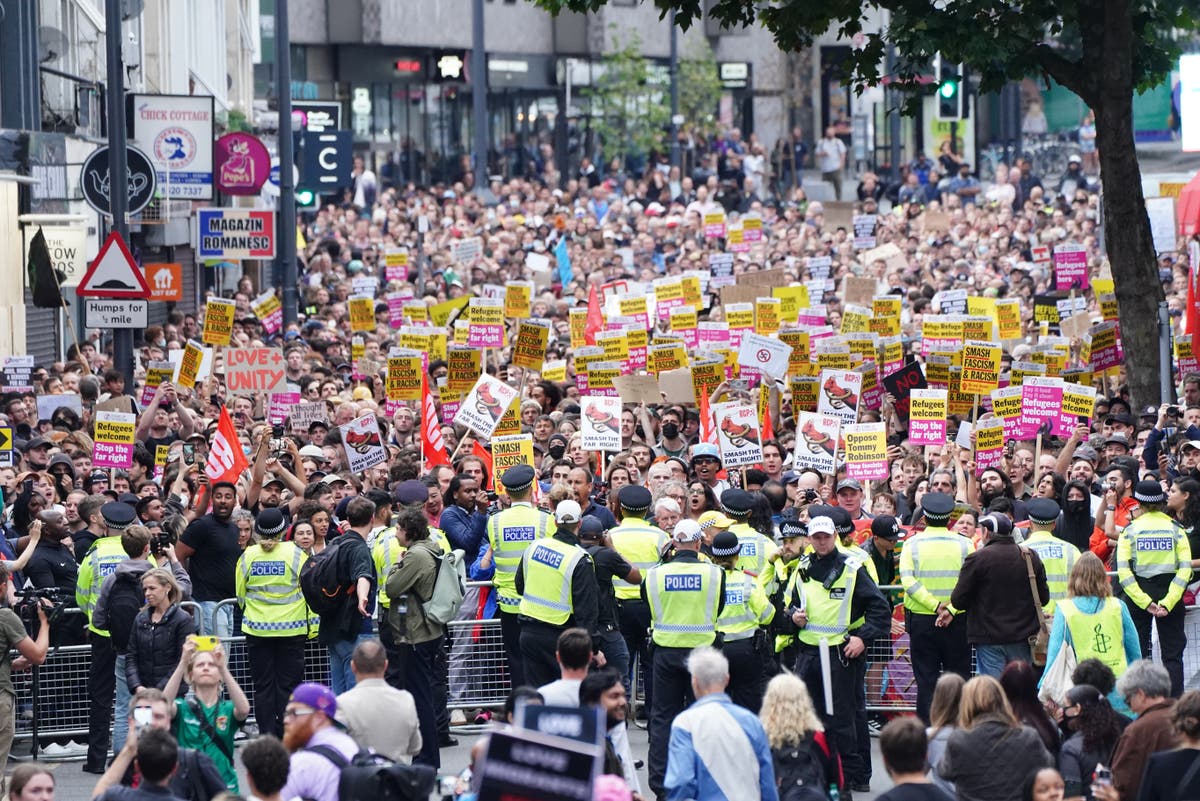
Racist pogroms and rioting took place in cities across England and Northern Ireland last month, particularly targeting migrants and Muslims. Right-wing extremists tried to set fire to refugee accommodation. They attacked mosques. People of color were assaulted on the streets. Violence of this magnitude targeting any community had not been seen in Britain in living memory.
The six-day racist rampage began in late August in north-west England, after false rumors spread on social media about the identity of a teenager suspected of murdering three children, and seriously injuring others, at a children's party in Southport on July 30. Misinformation about the murder was amplified sometimes from thousands of miles away. The mother of one of the murdered children had to call for violence to cease, hijacking her attention from her time of grief.
The violence was largely quelled by anti-racist demonstrations, with communities reclaiming the streets across the country from the far-right on Aug. 7. Nevertheless, the scale of the rioting demands a greater understanding of its context.
Evermore toxic social media
In the murder’s aftermath, Channel Four News revealed half of the fake tweets misidentifying the perpertrator's identity were retweeted from US-based accounts. Russian-backed news platforms also helped spread fake news, as did billionaire Elon Musk who enflamed the situation, tweeting: “Civil war is inevitable.” Today's interconnected social media landscape catalyzed the riot's severity, and Musk deserves blame for toxifying Twitter, now called X, by removing anti-hate moderators and reinstating accounts that had been banned.
Blame also lies with political figures and right-wing influencers, for instance Nigel Farage, leader of the right-wing populist party Reform UK. Without directly advocating for violence, he and many commentators of a similar ilk used their social and political platforms to push dog-whistle narratives and added fuel to the fire of false rumors.
In today's world, false news spreads fast. We need effective means to undermine and diminish the power of highly connected racist and nefarious actors to manipulate situations. Yet to really understand what spread from Southport we also need to explore Islamophobia, anti-migrant hatred, and how this led to a modern day pogrom.
An Indian warning
The new Labour UK government has taken a managerial approach of meetings, task forces and other hands-on actions. This contrasts greatly with the ineptitude and corruption of Conservatives that had been in power for 14 years. Yet the Labour response and messaging does little to suggest they understand why this violence happened in the first place.
An Islamaphobic pogrom that happened in India 22 years ago serves as a warning, Aman Sethi explains for OpenDemocracy. At the time, the government also took a managerial approach, failing to address the root causes of violence. This eventually opened the door for the authoritarian politician Narendra Modi – a political ally of the violent racists – to come to power at Prime Minister. Sethi urges Britain to avoid a similar pathway.
The new Labour government led by Keir Starmer has not directly challenged the anti-migrant narrative, nor the Islamophobia underlying the riots. The Labour party needs to recognise its active role and passive complicity in creating an atmosphere of hatred: the previous time the party was in power was in the early 2000s, when then PM Tony Blair led the UK to invade Afghanistan and Iraq under the auspices of the War on Terror. England’s Islamaphobic narrative can be traced back to the Crusades in the Middle Ages, and continues in 2024 with the UK's leading role in refusing to recognise and condemn the war crimes taking place in Gaza.
Tony Blair's Labour government also pushed anti-immigrant racism higher up on the agenda when it considered then-extreme measures to stop welcoming refugees, including establishing detention centers on distant Scottish islands and other instances of breaking international law. Blair also gave the far-right a propaganda victory by housing refugees in the country’s most impoverished boroughs, while ignoring those boroughs’ own impoverishment.
But primary responsibility for pushing anti-migrant sentiment to new levels in the UK lies with the Conservatives. During the riots last month, racist thugs chanted the Conservatives pledge, “Stop the Boats.” The Conservatives have led the charge demonizing migrants, Muslims and even human rights lawyers, who were also targeted by the mobs. Consecutive Conservative governments have done most to rip apart the fabric of the society through austerity cuts that have left children hungry, disabled people dying from poverty, and most people struggling to get by.
In opposition, Starmer's Labour Party did little to challenge the narrative that the country is full; in the run-up to the election, they were careful not to give people hope for the cost of living crisis to ease.
Challenging divide and rule
One far-right message used to inflame the August pogrom posited that white working-class communities are policed worse than other communities. This is of course easily undermined by looking at how the police oppress and threaten people of color, women and other marginalized groups. Under the Conservatives, however, the state became evermore draconian, with increased prison sentences for activists and the erosion of the European Convention on Human Rights.
Prime Minister Starmer's answer to the riots is more police. Yet more police and more police powers will only further quell social movements and protests that are working to make society more just. It will make every oppressed community more victimized, so that nefarious agitators can better push their falsehoods and lies.
Polls show only a small minority of people supported the riots. Contradicting the anti-white and anti-working-class narrative, research shows the majority of hatred is shared by middle-class, middle aged men. What Britain needs now is more politics, not more police.















